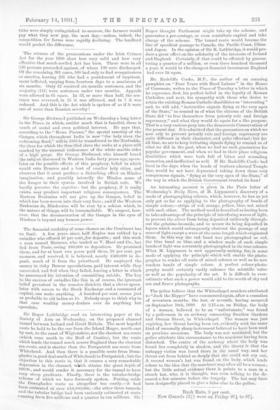Sir Roper Lethbridge read an interesting paper at the Society
of Arts on Wednesday, on the proposed channel tunnel between Ireland and Great Britain. The most hopeful route he held to be the one from the Island Magee, north-east by east, to the coast of Wigtonsbire, not the shortest sea-route (which runs north to the Mull of Cantire), but the route which lands the tunnel much nearer England than the shortest sea-route, and is shorter than the Portpatrick sea-route from Whitehead, And then there is a possible route from Dona- ghadee (a good deal south of Whitehead) to Portpatrick ; but the • objection to this route is, that it crosses a very remarkable depression in the channel, wlaich attains the great depth of 900 ft., and would render it necessary for the tunnel to have very steep gradients. Finally, there is the tubular-bridge scheme of which we have formerly spoken. Putting aside the Donaghadee route as altogether too costly,—it had been estimated at over £16,000,000,—the other three tunnels :end the tubular bridge had been variously estimated at costs running fromn five millions and a quarter to ten millions. Sir Roper thought Parliament might take up the scheme, and guarantee a per-tentage, or even contribute capital and take charge of the scheme. The tunnel route would become the line of speediest passage to Canada, the Pacific Coast, China and Japan. In the opinion of Sir R. Lethbridge, it would pro- duce a great effect on the solidarity of the interests of Ireland and England. Certainly, if that could be effected by guaran- teeing a quarter of a million, or even three hundred thousand a year, it would be the cheapest financial investment England had ever lit upon.


































 Previous page
Previous page